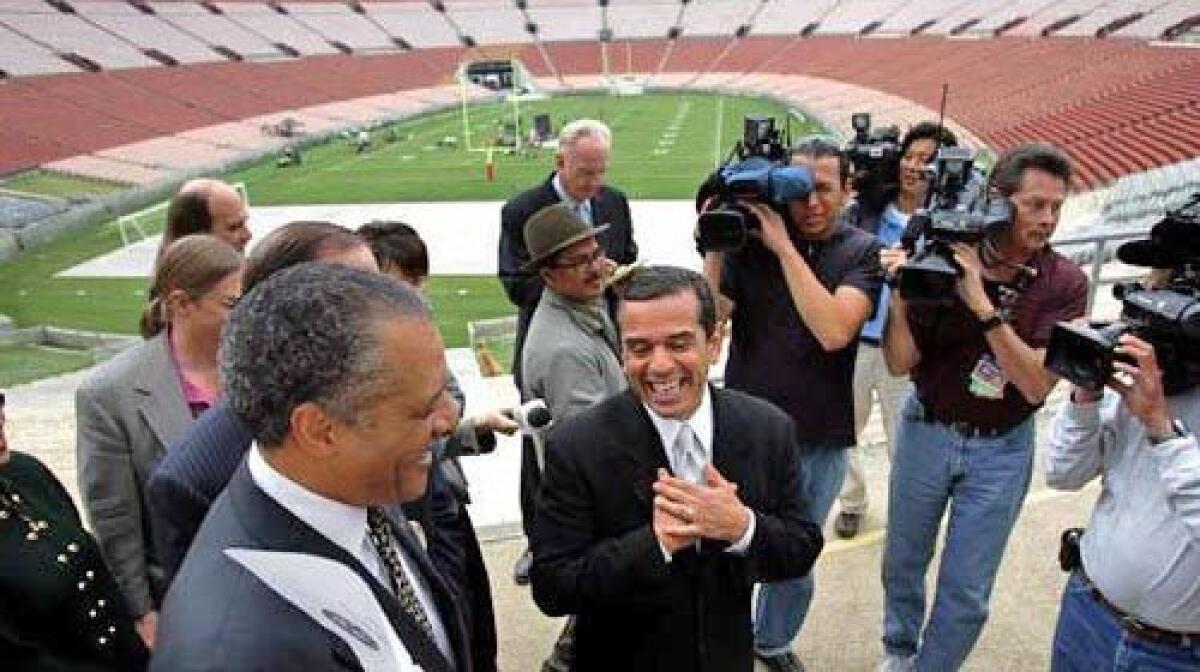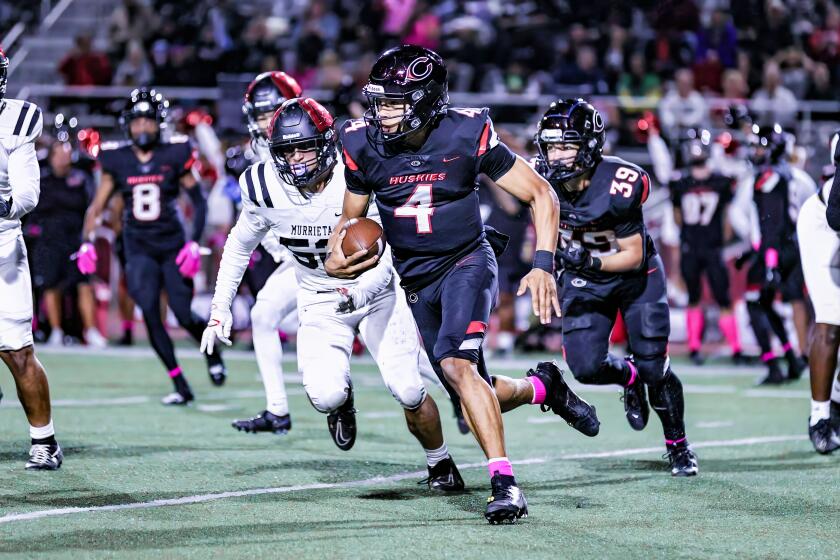Mayor benches NFL plan, wants Trojans in Coliseum

With USC threatening to move its home games to Pasadena’s Rose Bowl, Los Angeles Mayor Antonio Villaraigosa called for a long-term deal to keep the Trojans in the Memorial Coliseum, saying for the first time he has given up hope of the National Football League returning to the aging stadium.
“While I remain committed to bringing a professional team to Los Angeles, it is time to read the scoreboard,” Villaraigosa said in a statement Wednesday. “The Coliseum is no longer a viable option for the NFL.”
Many of the region’s wealthiest and most politically connected figures have spent years in abortive attempts to bring an NFL franchise to Los Angeles. The city’s leadership has insisted the league negotiate with the Coliseum -- an idea the NFL has repeatedly rejected.
The mayor’s unexpected reversal could open the way for an NFL deal elsewhere in the region. It also increases the pressure on the Coliseum to deal with USC.
Speaking to each other through the media Wednesday, the university and the Coliseum Commission suggested there is a chance at reaching a compromise.
Both sides seemed to agree that a potential lease would need to address at least two issues: renovating a stadium that has grown long in the tooth and giving USC some control over a place its football team has called home for 80 years.
“We would entertain anything if they want to make a proposal,” said Todd R. Dickey, USC’s senior vice president for administration.
But with university administrators frustrated by a lack of progress in negotiations, Dickey also made it clear that the clock is running. The Rose Bowl Operating Co. will consider USC’s request for a short-term lease at a meeting next Thursday.
“Frankly, if they approve it, we’ll sign it,” Dickey said.
The school’s two-year lease with the Coliseum expires after Saturday’s regular-season finale against crosstown rival UCLA.
Negotiations for a new lease have been hampered by the allure of the NFL and the commission’s desire to attract a pro team after losing the Raiders in 1994 and the Rams more than a decade earlier.
Renovations have been delayed because a new franchise would probably want to gut or even raze the existing structure. And USC has worried about becoming an afterthought in its own stadium.
On Wednesday, after revealing their negotiations with the Rose Bowl, university administrators fired a public relations salvo by posting a number of documents they had submitted to the Coliseum Commission, including two recent lease proposals.
Option A asks that the commission perform $100 million in renovations -- updating seats, restrooms and scoreboards, among other things -- while promising that no other amateur or professional team would play in the Coliseum.
Option B calls for USC to provide the $100 million for improvements. In return, the school would take charge of the venue and seek to recoup at least some of its outlay by generating revenue from year-round events that might include international soccer games and concerts.
USC would be open to a compromise, Dickey said, but he expressed skepticism about dealing with the commission.
“There is no such thing as the Coliseum Commission,” he said. “They are nine politicians, each with their own agenda, so it’s virtually impossible to negotiate with this nine-headed hydra.”
In fact, stadium officials appeared to contradict themselves on some points.
Pat Lynch, the Coliseum’s general manager, said that if USC wanted veto power over an incoming NFL team, and nothing more, “we could do the deal tomorrow.”
But City Councilman Bernard C. Parks, also a commission member, went against Lynch and Villaraigosa, saying the commission must keep the door open for a professional team.
Parks was talking about a years-long pursuit that has seen the Coliseum Commission flex its political muscle to push aside competing stadium concepts within the city limits.
Since the Raiders left after the 1994 NFL season, each of L.A.’s three mayors expressed strong support for the Coliseum as the city’s preferred NFL site over proposals at Dodger Stadium and in downtown.
Most recently, competing stadium groups from the Coliseum and Anaheim traveled to Dallas in May 2006 to pitch their concepts to NFL owners. Villaraigosa came in support of the Coliseum, telling the league that it was the premier site.
“The Los Angeles Coliseum is the clear choice for the NFL,” he said at the time, calling that stadium “a deal they can’t refuse.”
The Dodgers developed another plan two years ago for the Dodger Stadium parking lot, then backed off after criticism from civic and community leaders, with owner Frank McCourt publicly vowing to support the Coliseum “so long as the Coliseum is a viable site.”
In a July letter to the Coliseum Commission, NFL executive Neil Glat cited cost considerations in saying the league was “not prepared to move forward with the [Coliseum] project at this point.”
That’s when Villaraigosa’s thinking began to shift, with the mayor concluding that bringing the NFL to the Coliseum was “economically unfeasible,” Deputy Mayor Sean Clegg said.
However, Clegg added: “When one door closes, another opens. The mayor believes it’s time to look at other options in terms of making the NFL a reality in the Los Angeles market.”
Dodger Stadium might come back in play. NFL officials recently visited a proposed site in the City of Industry, but Dodgers Senior Vice President Howard Sunkin said the league did not tour Chavez Ravine and said talks with the NFL have not resumed.
“Nothing has happened,” Sunkin said. “Nobody has come by to visit.”
Reached late Wednesday, Ed Roski, owner of the City of Industry site, didn’t seem surprised by the mayor’s comments about the NFL and the Coliseum.
“I think the NFL has made that clear,” Roski said. “That’s why I got back active in this, and we’re progressing.”
And that is why Villaraigosa is now backing an effort to keep USC from leaving the Coliseum.
“The mayor believes that it’s time to contemplate the future of the Coliseum in terms of its relationship with its most loyal and long-standing tenant -- the USC Trojans,” Clegg said, adding that Villaraigosa spoke to Gov. Arnold Schwarzenegger on Wednesday and called for a joint effort to ensure USC stays put. Both leaders have appointees on the Coliseum Commission.
There are complications with the Trojans’ proposed move to Pasadena, which would require approval from not only the 13-member Rose Bowl Operating Co., but also the Pasadena City Council and UCLA, which has played its home games there since 1982.
At this point, USC is asking only for one year and an option on a second.
In an e-mail Wednesday, UCLA Athletic Director Dan Guerrero assured Bruin football supporters that the university would oppose any long-term arrangement between USC and the Rose Bowl.
Coliseum Commissioner Bill Chadwick predicted that USC students and Orange County-based alumni might grow tired of driving the extra miles.
“I think it would be great if they played at the Rose Bowl for two years,” the commissioner said. “At the end of that two years, the leverage we would have in negotiations would be spectacular.”
Times staff writers Duke Helfand, T.J. Simers and Bill Shaikin contributed to this report.
More to Read
Go beyond the scoreboard
Get the latest on L.A.'s teams in the daily Sports Report newsletter.
You may occasionally receive promotional content from the Los Angeles Times.












